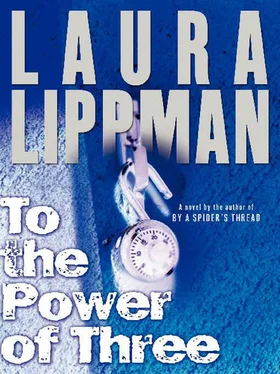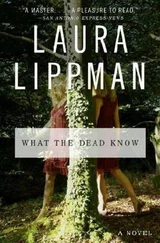Josie was a nonspeaking lost boy, until Sylvia realized how agile she was and asked her to take the part of Michael, Wendy’s brother. “You don’t have a dancer’s personality,” Sylvia said, “or even a dancer’s arches. But you move very well. And that’s important for flying.”
Flying! Actual stage flying! It turned out that Sylvia had called on old contacts to obtain the patented wire system, Flying by Foy, used by theatrical companies whose actors needed to take flight. Even Perri was jealous, for Hook did not fly at all, and Josie was exceptionally good at flying, even better than the girls chosen to play Peter in either cast, so good that Sylvia urged the Patels to let Josie audition for a Baltimore production of A Midsummer Night’s Dream, which needed flying fairies. Josie could tell this bothered Perri a little, and she felt bad because theater wasn’t important to her, except for the flying. It was a relief to soar through the air again, given how her instructors at Gerstung had not encouraged Josie to pursue gymnastics competitively. She had the technical skills, they told her parents, but not the mental ones. She choked at meets, flubbing moves that she executed flawlessly in practice.
As for Kat, she asked to be Nana, the sheepdog nanny. She liked dogs. Moreover, she liked being hidden inside the huge, shaggy costume. “Eight hundred dollars for theater camp,” Mrs. Hartigan said, “and we don’t even get to see your face.”
They performed the play four times, with Creamy taking the night shows and Crunchy the matinees, the stars in one cast appearing as chorus in the other. The Sunday matinee was especially lethargic, and the girl playing Mrs. Darling disappeared mere minutes before curtain. (On a bathroom break, it was discovered after the fact.) The result was a show that opened on an empty stage and remained empty, the pianist in the pit playing the strains of “Tender Shepherd” over and over again. “ Do something,” Sylvia muttered to no one in particular. Kat, waiting in the wings for her entrance, took this admonition literally, removing her dog’s head and beginning to sing the lullaby in a pure, true voice that no one had ever suspected of her. The voice soared out like birdsong, serene and effortless. Then Mrs. Darling showed up, and the play went on, although it never quite recovered from its limp, improvised beginning. Perhaps it was because people in the audience kept waiting for that beautiful voice to return.
“Did you know that Kat could sing like that?” Sylvia demanded of the Hartigans afterward. Mrs. Hartigan shrugged, still miffed about her daughter’s costume, but Mr. Hartigan said he believed Kat could achieve any goal she set for herself. Three months later he moved out, proving that Kat could not, in fact, achieve any goal she chose, for she certainly would have rescued her parents’ marriage. But that would happen in the fall, after Labor Day. The rest of the summer was spent in blind devotion to Jesus.
Not Jesus per se, of course, but Jesus as embodied by Peter Lasko, in Sylvia’s centerpiece production, the one performed throughout August in the Glendale community center. The girls, accompanied by Mrs. Kahn, first went to the show because of their newfound devotion to theater. Before the lights went down, Perri was a little superior, telling Josie and Kat that Godspell was second-rate, with a treacly, unmemorable score, not at all in the class of Stephen Sondheim, someone of whom she now spoke incessantly, almost as if they were dating. She also told Kat and Josie that some Jewish parents in Glendale -“Not yours,” Mrs. Kahn interjected-had tried to talk Sylvia out of mounting it, saying it was a flat-out attempt to proselytize. So the play already had a certain forbidden aura before the first notes sounded on the shofar and the cast began moving through the audience in preppy clothes that Sylvia had chosen in an attempt to rethink Godspell’ s hippie legacy. Throwing fake money in the air-the stock market was still riding high-they began to exhort the audience to prepare for the way of the Lord.
And then Peter Lasko bounded onto the stage, dressed in khakis and a button-down shirt, instead of the traditional suspenders and Superman T-shirt that Josie knew from the CD’s cover. “Interesting concept,” whispered Perri’s mother. “I guess at the dawn of the new millennium, Jesus is a CEO.”
Josie had no idea what Mrs. Kahn was talking about, nor did she care. She thought Jesus was the best-looking boy she had ever seen. Could such a person really have emerged from Glendale High School just a few weeks ago? Would there be other boys like that at the high school? The show unfolded before her dazzled eyes, and even a more objective critic than Josie would have to admit that Peter Lasko was an extraordinary performer, almost too extraordinary, for his professional sheen revealed the limitations of the rest of the cast. He was like Perri in Peter Pan, with a sweet tenor that was better than anyone in Josie’s current collection of CDs, even Nick Lachey of 98 Degrees or the boy who sang about the angel. (It was okay to like Nick Lachey back then, especially if you were fourteen.) Josie’s nonexistent theatrical ambitions caught fire as she watched, inspired not just by Peter’s obvious talent but by the realization that the stage was a place where a boy really might take one’s hand and sing, You are the light of the world . And where a girl could lasso that boy with her mink stole-“Traditionally it was a feather boa,” Perri’s mother whispered-and bring down the house with the line “Come here, Jesus, I’ve got something to show you.”
Upon learning that Peter Lasko was a lifeguard at the Glendale pool, the girls began spending long afternoons there, splashing hilariously in the five-foot section, which happened to place them at his feet. At the campfire, in their bedrooms, the girls rehearsed the sexy number, the one with the mink stole, swooping around and shimmying their shoulders. At least Perri and Josie did those things. Kat insisted she wasn’t interested in boys. She said it was silly, to talk about love at fourteen, when most grownups couldn’t figure it out. She said she never planned to marry, or not until she was really old, thirty or thirty-five. Her parents were still together then, but fighting more and more. Up in Kat’s room, under the sloping eaves, Josie had heard Mrs. Hartigan screaming at Mr. Hartigan and Mr. Hartigan responding in a lower, pleading voice. Kat stared at the ceiling as if she couldn’t hear anything.
“I don’t want to get married either,” Perri said. “But maybe we should have boyfriends, once we go to high school. Lots of girls in middle school had them.”
“My father wouldn’t let me go out with boys yet,” Josie said quickly, as if this explained everything.
“There are ways to have a boyfriend without a parent knowing,” Perri said. “You didn’t have a boyfriend because no one liked you that way.”
“Shamit did,” Kat said. “He gave her a card on Valentine’s Day, and that little tiny box of Godivas.”
“Shamit doesn’t count,” Perri decreed, and while Josie agreed, she was annoyed at Perri’s firmness on this topic. Why didn’t Shamit count? Because he competed in things like science fair and spelling bee? Because he was Indian? Because his parents were Indian- Indian, Sikhs with accents and odd ideas? It was one thing for Josie to assume that Shamit had chosen her for her last name, another for Perri to say it out loud.
“Why did you fall in love with Daddy?” she had asked her mother.
“Because he was drop-dead gorgeous,” her mother had said promptly. “And exotic . I never saw anyone like your dad until I went to Grinnell. Actually, that’s not quite true. When I was young, there was a magazine called 16, and it used to run features about a young actor named Sajid something. I could never figure out what he was famous for, other than appearing on an episode of The Big Valley . But he was so handsome. Maybe that’s why I fell for your father, all those years later, because of my unrequited crush on the mysterious Sajid.”
Читать дальше












